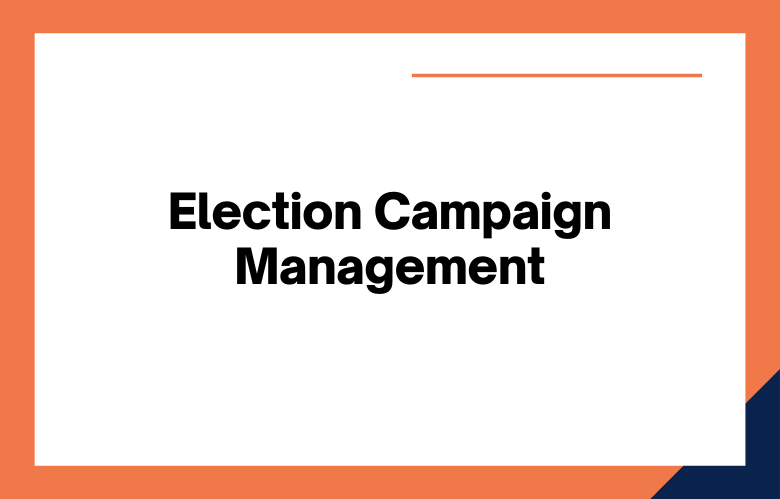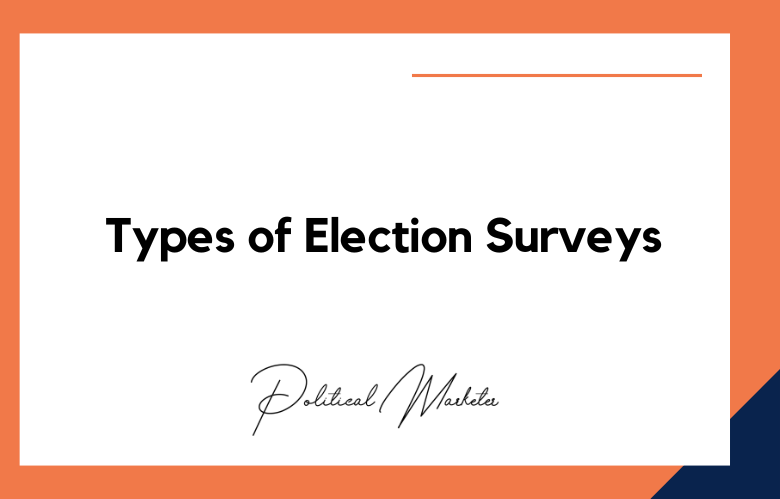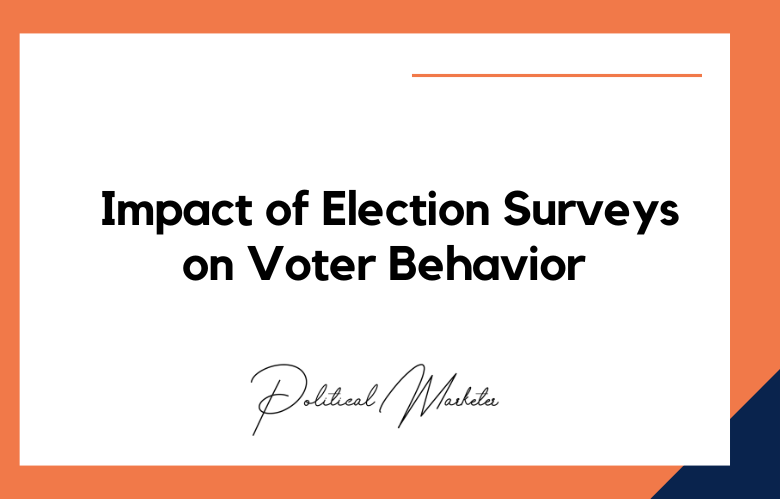Running a successful election campaign is a difficult feat. It requires careful preparation and an understanding of the environment in which you are operating. This post will discuss developing an effective campaign strategy, from building your team to advertising on trending social media channels such as Facebook, Twitter, and Instagram.
It would help if you had a clear idea of your objectives for running the campaign; without them, your strategy may be ineffective or unfocused. For example: do you want to win? Secure votes? Raise awareness about specific issues. You’ll need to tailor your approach accordingly while keeping true to who you are as a candidate (personal strengths). If this sounds confusing, don’t worry!
What is Election Campaign Management?
Managing an election campaign is a difficult job. Not only do you have to win the campaign, but you also need to manage many different people, volunteers, and resources.
In a nutshell, election campaign management refers to overseeing an electoral campaign.
Election campaign management refers to the practices involved in creating and distributing ads for a political campaign.
Election campaigns are expensive exercises that require a lot of work. However, with the relevant tools and strategies, you can run an effective campaign for less money than you might think.
The objective of election campaign management is to identify the political needs and then sell the candidates based on the platform and manifesto.
Key Winning Strategies from Election Campaigning
A significant part of an election campaign is to appeal to as many people as possible. They need a platform that speaks for everyone; sometimes, finding that perfect balance can be challenging.
There are critical winning strategies for election campaigning. One of the most important things is to talk to people directly.
When it comes to the election campaign, there are many vital strategies that you should know. First off, you need to identify your target audience and get potential voters on your side.
To win an election, you should ensure that your party has the most experience. If you’re a newcomer, people will find it hard to trust you.
To win the elections in a country, it is essential to have proper strategies and techniques.
- Build a strong campaign team
- Write a winning slogan
- Create a plan for your campaign strategy and tactics
- Get the most out of social media ads, including Facebook, Twitter, Instagram, and YouTube
- Use data to inform your decisions about who to target with what messages
- Establish a clear and concise message
- Create an emotional connection with voters
- Organize your campaign team to maximize efficiency
- Make use of social media to reach out to potential supporters
- Create a strong narrative that highlights the candidate’s strengths rather than their opponents’ weaknesses
- Research the demographics of your target audience
- Figure out what issues are most important to your target audience and address them in a way that will resonate with them.
- Develop a message that resonates with people’s needs, values, fears, and ambitions while being consistent throughout all media channels.
- Create an effective campaign strategy by understanding who is voting for you and who isn’t; it is critical not to waste time trying to persuade voters who have already decided about you or another candidate.
- Build a strong team- find talented individuals with diverse skill sets from different backgrounds.
- Develop a clear and concise campaign message
- Build a robust and diverse team of volunteers
- Make sure your supporters are registered to vote
- Use data from the polling and focus groups to decide where you will spend time campaigning.
- Research to find out what voters want.
- Create a campaign slogan and logo that is memorable, unique, and conveys your message.
- Find volunteers to help you with the campaign.
- Develop an effective strategy for canvassing door-to-door
- Create a social media presence through Facebook ads, YouTube videos, or Twitter posts
- Develop a clear and detailed campaign platform
- Get the support of key party members, donors, and volunteers
- Create a compelling campaign slogan or catchphrase
- Raise money for your campaign
- Stay on the message to avoid being distracted by opponents’ messages or scandals in the media.
- Use social media to reach voters
- Identify your key message and stick to it
- Use social media to get the word out about your campaign
- Be authentic- don’t try to be something you’re not
- Stay on top of current events so that you have a clear understanding of what is going on in the world, both domestically and internationally
- Have an action plan for when things go wrong (i.e., natural disasters)
- Campaigning is a long process- don’t wait until the last minute to get started
- Make sure you have an idea about your audience and what they want
- Find out who your opponent’s supporters are and how you can turn them against their candidate
- Please keep track of all the information on your campaign so that it’s easy for people to find it later on
- Stay organized with planning tools like Google Calendar or Excel spreadsheets
- Find a robust and memorable message
- Get your name out there and be seen as often as possible
- Engage with voters on social media platforms to show you care about them
- Do not underestimate the power of grassroots campaigning and door-knocking
Campaign Management for the Basic Political Campaign
Campaign management is a complex job that requires experience and skill.
The most crucial element in any campaign is getting your message out to people. There are three critical campaign steps: fundraising, social media strategy, and donor management.
Campaign Management for the Advanced Political Campaign
Advanced campaign management is required for any political candidate to be successful. For example, if your campaign has a website optimized with the right keywords, you’re more likely to get donations from people interested in what you say.
How to Conduct Research on Your Opponent During an Election Cycle
You can do this by researching the candidate and his past. This might include checking their online presence, exploring things they have said in previous interviews or speeches, looking through various records of theirs (like official transcripts), etc.
Don’t let yourself be caught off guard. Research your opponent well in advance of the campaign season so that when it starts, you’re prepared in advance to throw at you.
One of the essential things before running for office is getting a good sense of your opponent. Researching them will allow you to create a robust platform to counter their positions and provide voters with more options.
Before running for office, make sure you have researched the current politicians in power. You can do this by reading their voting records or watching videos of them speaking at public events.
The Importance of a Good Marketing Plan in a Political Campaign
A campaign manager must have a good marketing plan to ensure the candidate gets their message across. They need to use all modern methods of communication, including social media platforms.
One of the essential elements in any political campaign is good marketing. Marketing allows your candidate to sell themselves and their ideas to the public, ultimately determining whether or not they win an election.
Having a marketing plan is essential for any political campaign. A good one will help you reach the right audience and translate your message into votes.
A good marketing plan is essential to winning an election. You will want your message to be heard by the public, but for that to happen, you must first understand what makes a good campaign.
The Role of Fundraising in an Election Cycle
Fundraising is a critical component in all election cycles. It can be challenging to raise money because donors may not always have the resources. Still, organizations that fundraise successfully will ultimately have an advantage over their competitors.
There are several ways to raise money in an election cycle. Some candidates use personal funds, while others turn to grassroots fundraising and public donations.
Before a candidate can start campaigning, they first need to raise money. This is done through individual donations and political action committees (PACs).
One of the most critical aspects of an election cycle is fundraising. An effective strategy can mean the difference between success and failure.
Winning Strategies of a Local Election Campaign
A successful campaign starts by building a team of dedicated volunteers who will execute your vision.
- Create a clear and concise platform
- Research the competition
- Focus on connecting with voters through social media, door-to-door campaigning, and town hall meetings.
- Make sure your campaign is transparent about finances
- Research your opponents
- Study past campaigns and elections
- Create a campaign slogan for your platform
- Find volunteers to help you with fundraising, canvassing, and other tasks
- Reach out to local businesses for donations or sponsorship opportunities
- Build a strong team of volunteers
- Keep your message consistent and concise
- Use social media to interact with voters, share information about the campaign, and get feedback on what people are interested in hearing more about
- Create a plan for effectively using resources like time, money, and staff members.
- Create a campaign slogan.
- Make a list of supporters and create a list of people you want to contact for support.
- Develop an outreach plan- who are your constituents, where do they live, and what is the best way to communicate with them?
- Research your opponent’s strengths and weaknesses- what are their policies on issues that affect your community?
- Brainstorm ways to get media coverage to increase name recognition
- Make sure your message is clear and concise
- Know your audience
- Campaign on social media and the internet to reach potential voters who are not in your area or state
- Use different tactics such as billboards, pamphlets, posters, newspapers, radio, and TV ads to get voters’ attention.
- Identifying the target audience and what they care about
- Set up a campaign office to create an atmosphere of success, including posters, banners, signs, and other promotional materials
- Create a social media presence on Facebook and Twitter
- Launch a website with detailed information about the candidate’s positions on issues that matter to voters
- Make sure you have enough volunteers at all times for phone banking and canvassing efforts
- Identify the problems that are most important to your constituency
- Use social media to promote yourself and get feedback from voters
- Reach out to potential donors and convince them of your worthiness with a compelling pitch
- Address any concerns about you or your campaign head-on, using facts instead of speculation as ammunition
- Find ways to make yourself available for public appearances, even if they’re not in person
- Identify your constituency and what they care about
- Develop a campaign message that speaks to their values
- Create a list of talking points for speeches, debates, interviews, and ads
- Research the issues voters care about so you can have informed opinions on them
- Build relationships with community members by attending events in your area or meeting with local leaders
- Develop a campaign strategy
- Create an online presence
- Use social media strategically to target voters
- Get endorsements from political leaders and other community members
- Raise money for your campaign
Conclusion
The key to a winning campaign is having the right people and investing time developing them. If you’ve found your perfect team, but they don’t have enough experience or skills yet, use these tips to train your staff before it’s too late. Here, you can read our blog post on why local business owners should invest in their employees’ training.
Election Campaign Management is a difficult task. Simultaneously, it can be rewarding for you and your campaign supporters if you can maintain an effective strategy that meets with success.
The fundamental strategy we’ve outlined in this blog post should give you some ideas to ensure campaigns stay on track, not to reach their goals but to have a lasting impact long after the election. Let us know if you have other questions or concerns by sending us a message through the contact form; our team will reach you shortly!
Ultimately, it is essential to remember that an election campaign should be managed strategically. The vital winning strategies outlined here are just some of what you can use to create and manage your successful campaign. Whether you’re looking for ways to improve voter turnout or how best to win over undecided voters, these tips offer plenty of ideas for success!
Frequently Asked Questions (FAQs)
What is election campaign management?
Election campaign management is the strategic planning, execution, and oversight of all activities designed to help a candidate or party win an election, including messaging, budgeting, team coordination, outreach, and compliance.
Why is campaign management important in elections?
Effective campaign management ensures that resources are used efficiently, messaging remains consistent, voter engagement is maximized, and deadlines are met, increasing the chances of electoral success.
What are the core components of a successful campaign?
Key components include a clear message, target audience research, strategic planning, volunteer and staff coordination, data analytics, digital presence, fundraising, and voter outreach.
Who manages an election campaign?
A campaign is typically led by a campaign manager, supported by strategists, communications directors, digital teams, field organizers, volunteers, and finance coordinators.
How do you develop a campaign strategy?
Start by analyzing voter demographics, setting goals, identifying key issues, choosing channels, crafting messages, and aligning tactics with timelines and budgets.
What is the role of data in campaign management?
Data is used to segment voters, track engagement, analyze feedback, optimize messaging, monitor performance, and improve targeting for canvassing and ads.
How do you manage a political campaign budget?
Create a detailed budget based on campaign goals, allocate funds across priorities (media, staffing, events, ads), monitor expenses, and adjust based on performance and fundraising.
What tools help with election campaign management?
Popular tools include NationBuilder, Ecanvasser, NGP VAN, Google Ads, Meta Business Suite, email automation software, CRM platforms, and analytics dashboards.
How do you build a strong campaign team?
Recruit individuals with skills in communications, strategy, logistics, outreach, tech, and fundraising. Clearly define roles, responsibilities, and workflows.
What’s the importance of a campaign timeline or calendar?
It ensures that key activities—like filing deadlines, rallies, debates, and ad campaigns—are scheduled and executed on time, keeping the campaign on track.
How is social media used in campaign management?
Social media is used for direct communication, advertising, event promotion, crisis response, and community building. It allows real-time voter interaction and rapid message dissemination.
How do you measure the success of a campaign?
Success metrics include polling trends, voter engagement rates, fundraising goals, digital analytics, volunteer growth, and ultimately, election results.
What is ground game or field operations in a campaign?
Field operations involve in-person voter outreach through door-knocking, phone banking, community events, and grassroots organizing to mobilize supporters.
How do digital and traditional media campaigns differ in management?
Digital campaigns offer real-time analytics, lower costs, and personalization, while traditional media (TV, print, radio) provides broad reach and brand familiarity. Both require coordination and tailored messaging.
What is GOTV and why is it crucial?
GOTV (Get Out The Vote) is the final stage of the campaign focused on ensuring supporters actually vote. It includes reminders, transportation, phone calls, and canvassing.
How do you handle crisis management during a campaign?
Prepare a crisis communication plan, assign a spokesperson, monitor media and public sentiment, respond transparently, and stay on message to mitigate damage.
How often should a campaign evaluate its performance?
Campaigns should conduct weekly or biweekly assessments to review goals, messaging impact, digital metrics, fundraising, and adjust strategy as needed.
What are common challenges in campaign management?
Challenges include limited resources, internal miscommunication, opposition attacks, volunteer burnout, tech mishaps, and changing public sentiment.
How do you ensure legal and ethical compliance during a campaign?
Work with legal advisors to follow election laws regarding finance, advertising, voter communication, and data use. Maintain transparency and documentation.
What makes an election campaign management strategy successful?
Success stems from clear goals, data-informed decisions, consistent messaging, adaptable strategies, strong team collaboration, and voter-centric outreach.
One way to get in touch is by filling out our online form on this site or give us a call at +919848321284. Let’s work together today!










